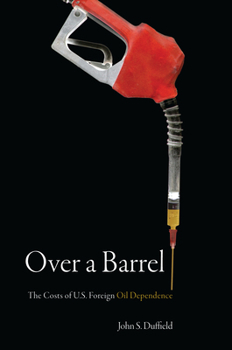Over a Barrel: The Costs of U.S. Foreign Oil Dependence (Stanford Law Books)
Select Format
Select Condition 
Book Overview
The United States is highly dependent on foreign oil. Well over half of the oil and petroleum products consumed in America--approximately 12 million barrels per day, or more than 600 gallons for every man, woman, and child each year--now come from abroad. And the U.S. government projects that the level of imports will only continue to rise, reaching between 16 and 21 million barrels per day by 2025.
What precisely are the costs of U.S. foreign oil dependence? Unfortunately, no one has yet offered a satisfactory answer to this vital question. As a result, the costs to the United States of its dependence on oil from abroad have gone largely unrecognized and, in fact, are much greater than most people realize. Some costs, like the annual bill for oil imports--and, by reflection, the price that motorists pay at the pump or the size of homeowners' heating oil bills--are obvious and quantifiable. A number of others, however, are not so apparent or easy to measure. For example, it is difficult to put a price tag on the costs of coddling oil-rich authoritarian regimes at the expense of promoting representative government, human rights, and other important values.
This book seeks to remedy this oversight by providing the first comprehensive analysis of the costs--both economic and policy-related--of U.S. foreign oil dependence and how they might be reduced. It shows that since the 1970s, the economic costs alone have run into the trillions of dollars. Successive administrations have tended to neglect the opportunities at home to reduce these costs by limiting demand. Instead, they have emphasized foreign and military policies that have proven both highly expensive and largely unsuccessful.
One positive conclusion the author draws is that the opportunities for reducing oil consumption remain largely unexploited and the costs of U.S. foreign oil dependence can still be substantially reduced at relatively little expense. At least as important, however, will be rethinking and revising the expensive foreign, security, and military policies and commitments that have developed around U.S. foreign oil dependence over the past three decades.






